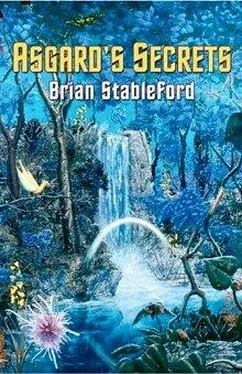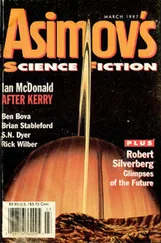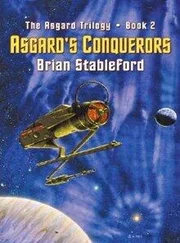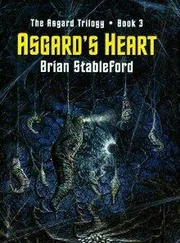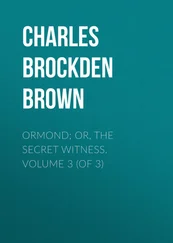“It was inside your boot heel,” he replied. “When the giant took your truck, we knew you would need a replacement suit and we knew your specifications. Wherever that boot goes, it leaves an organic trace. We could have followed it anywhere, but we only needed to find the location of the shaft. Our intention was to wait for you there— hoping, of course, that you did not return. It would have been suitably ironic, would it not, if the android had killed your companions just as he killed my men?”
I didn’t tell him that we’d left Crucero behind to take care of the possibility that he’d wait at the top of the shaft. It didn’t seem necessary or diplomatic. I decided to let him believe that it was our present hosts who had organised the flame-pistol party.
“Well,” I said, “it’s all water under the bridge now. The question is: what do we do next?”
“There is nothing behind me but a closed room,” said Guur.
“Same here,” I told him. “That leaves us only one direction to go—and who knows who we might meet? Would you like to lead the way?”
“I have the gun,” he reminded me. “ You lead the way.”
Amara Guur was exactly the kind of person on whom one should never turn one’s back, but sometimes you don’t get the choice.
I turned into the corridor where neither of us had been, and led the way toward our next encounter.
The corridor twisted and turned, but there was never more than one way to go. It could have been a veritable maze had the observers wanted it to be—I was morally certain that they could have opened up doorways and alternative pathways wherever they desired—but it seemed that they only wanted to take us from point A to point B.
Point B, as it transpired, was a big open space. We came out of a narrow portal to be faced with an alien forest. By alien, I don’t just mean that it was like no place I’d ever been—having never been to Earth I had no real experience of the kind of plain which they’d shown to me when I first awoke, but it had been an environment where I had some slight sense of belonging. Here, the sensations awakened in my mind when I looked upon the strange bushes and trees was exactly the opposite; this was a place where I emphatically did not belong.
It wasn’t the shapes which made it seem so odd—foliage, I guess, can come in a range of shapes so vast that nothing seems particularly extraordinary—but the scale of things. The leaves, which were dark of hue, were all very large. They were mostly green, though some were streaked with crimsons and violets. The flowers, which were very gaudy— though their colours too seemed dark, with no whites or pastel shades—were enormous, every blossom the size of a man’s torso. The yellows were all ochreous, the blues tended toward indigo, the reds were blood-dark; all the stamens and styles which clustered at the heart of each bloom were black. Most of the flowers were bell-shaped things, though some were like hollow hemispheres; almost without exception they pointed upwards, at the ceiling, which was blazing with golden electric light a mere twelve metres above the forest floor.
There were very few things that I could think of as trees, though there was not a single plant which seemed small. Rather, they were bushes writ large, or lily-pads on a gargantuan scale. They grew tightly clustered together, leaving not even the narrowest of paths where a humanoid might comfortably walk between them. They towered above me, and although their topmost tendrils could only have reached three-quarters of the way to their artificial sky, they seemed to have command even of that empty space which they left.
The scent was overpowering, sickly sweet. There was a sound like the whirring of a bull-roarer, which at first I could not trace to its point of origin. Then I saw something clambering over the lip of one of the blossoms, and realised that it was a huge flightless insect, the size of a man’s head, coloured as darkly as the plant on which it wandered, in shades sufficiently similar to make it difficult to see until it moved. I realised then that the sounds must be made by similar creatures, chafing their body-parts like grasshoppers.
“Do you recognise this place?” I asked the vormyran, my voice not much above a whisper.
“No,” he replied. “I have traveled in most of the tropical lands of my homeworld, but I have seen nothing remotely like this.”
I wondered if this was the native territory of the people who lived on this level. If so, it would be easy to believe them giants. But I did not leap to that conclusion. For one thing, the ceiling was only twelve metres above our heads— no higher than the ceilings in levels one, two and three, which had been inhabited by humanoids of normal size. For another, the grey wall to either side of the doorway curved quite noticeably as it extended away. If that curve were to be extrapolated, its implication was that we were in an enclave no more than a kilometre in diameter. This was nothing but a big garden, or a vivarium; it was not an entire world by any means.
I was about to ask what we should do next, but the question died unasked when there came a new sound, much louder than the chirring of the pollinators which scrambled around the giant blooms.
There was no mistaking the sound; it was gunfire.
The gun that was being fired wasn’t a flame-pistol, nor even a needier. It was an old-fashioned crash-gun blasting away on automatic, sending out a veritable hail of bullets.
The moment the gunfire stopped, the insects started. When we had first heard them, they had obviously been in their restful mood—now, they were panicked. The bull-roarer sound was amplified a thousand times, into an appalling screech, which went on and on and on.
I clasped my hands to my eardrums, trying to keep out the dreadful noise, and Amara Guur did the same, although the needier was still tightly clutched in the fingers of his right hand. I tried to move back into the corridor from which we had come, but I hit the solid wall, and when I half-turned in surprise, I found that the portal was no longer there. The grey wall was solid and seamless, enclosing us.
We huddled against the smooth surface until the sound died away, the crescendo easing down until the former level of sound was restored. Only then was it possible to speak.
“That way,” said Guur, gutturally. He pointed away to the right, in the direction from which the noise of gunfire had come.
There was a narrow curved pathway running along the edge of the wall, where the plants did not quite extend themselves to the boundary of their allotted space. It was easy enough to follow, and we followed it at a run.
A hundred metres or so round the curve we found a nearly-naked Spirellan and a scantily-clad Kythnan female crouching over a bloodstained body. The body was wearing dark underclothes of a kind I had seen before—under a Star Force uniform. The Kythnan was Jacinthe Siani; I jumped immediately to the conclusion that the Spirellan, who was still holding a handgun pointed at the dead man, was my old acquaintance Heleb.
While Guur and I approached from one direction, two more vormyr were approaching from the other. I suspected that the trouble I was in had just become five times worse.
I went quickly to the dead man. It was Khalekhan—he had taken three shots in the chest and had almost been cut in half. He was holding a flame-pistol, which hadn’t been fired. I didn’t even reach for it, but Heleb grabbed me round the neck with a hairy arm, and held me tight until one of the newcomers had appropriated it. When he let me go, I remained kneeling, but I turned away from the body to look up at my captors.
“That is one of the persons who ambushed us,” said Heleb. “I saw him—just before those robots swarmed all over us.” I knew it was a case of mistaken identity, but I wasn’t about to say so.
Читать дальше
